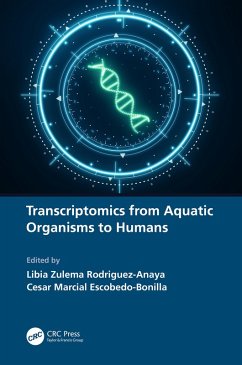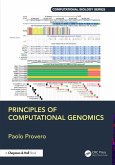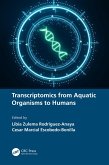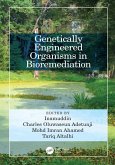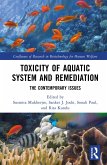Transcriptomics from Aquatic Organisms to Humans (eBook, ePUB)
Redaktion: Rodriguez-Anaya, Libia Zulema; Escobedo-Bonilla, Cesar Marcial
47,95 €
47,95 €
inkl. MwSt.
Sofort per Download lieferbar

24 °P sammeln
47,95 €
Als Download kaufen

47,95 €
inkl. MwSt.
Sofort per Download lieferbar

24 °P sammeln
Jetzt verschenken
Alle Infos zum eBook verschenken
47,95 €
inkl. MwSt.
Sofort per Download lieferbar
Alle Infos zum eBook verschenken

24 °P sammeln
Transcriptomics from Aquatic Organisms to Humans (eBook, ePUB)
Redaktion: Rodriguez-Anaya, Libia Zulema; Escobedo-Bonilla, Cesar Marcial
- Format: ePub
- Merkliste
- Auf die Merkliste
- Bewerten Bewerten
- Teilen
- Produkt teilen
- Produkterinnerung
- Produkterinnerung

Bitte loggen Sie sich zunächst in Ihr Kundenkonto ein oder registrieren Sie sich bei
bücher.de, um das eBook-Abo tolino select nutzen zu können.
Hier können Sie sich einloggen
Hier können Sie sich einloggen
Sie sind bereits eingeloggt. Klicken Sie auf 2. tolino select Abo, um fortzufahren.

Bitte loggen Sie sich zunächst in Ihr Kundenkonto ein oder registrieren Sie sich bei bücher.de, um das eBook-Abo tolino select nutzen zu können.
This book includes transcriptomic studies of non-infectious and infectious diseases affecting humans and environmental and physiological correlates affecting shrimp and fish aquaculture.
- Geräte: eReader
- mit Kopierschutz
- eBook Hilfe
Andere Kunden interessierten sich auch für
![Principles of Computational Genomics (eBook, ePUB) Principles of Computational Genomics (eBook, ePUB)]() Paolo ProveroPrinciples of Computational Genomics (eBook, ePUB)59,95 €
Paolo ProveroPrinciples of Computational Genomics (eBook, ePUB)59,95 €![Transcriptomics from Aquatic Organisms to Humans (eBook, PDF) Transcriptomics from Aquatic Organisms to Humans (eBook, PDF)]() Transcriptomics from Aquatic Organisms to Humans (eBook, PDF)47,95 €
Transcriptomics from Aquatic Organisms to Humans (eBook, PDF)47,95 €![Genetically Engineered Organisms (eBook, ePUB) Genetically Engineered Organisms (eBook, ePUB)]() Genetically Engineered Organisms (eBook, ePUB)65,95 €
Genetically Engineered Organisms (eBook, ePUB)65,95 €![Genetically Engineered Organisms in Bioremediation (eBook, ePUB) Genetically Engineered Organisms in Bioremediation (eBook, ePUB)]() Genetically Engineered Organisms in Bioremediation (eBook, ePUB)186,95 €
Genetically Engineered Organisms in Bioremediation (eBook, ePUB)186,95 €![Gene Transfer to Animal Cells (eBook, ePUB) Gene Transfer to Animal Cells (eBook, ePUB)]() Richard TwymanGene Transfer to Animal Cells (eBook, ePUB)32,95 €
Richard TwymanGene Transfer to Animal Cells (eBook, ePUB)32,95 €![Toxicity of Aquatic System and Remediation (eBook, ePUB) Toxicity of Aquatic System and Remediation (eBook, ePUB)]() Toxicity of Aquatic System and Remediation (eBook, ePUB)51,95 €
Toxicity of Aquatic System and Remediation (eBook, ePUB)51,95 €![Advances in Molecular Toxicology (eBook, ePUB) Advances in Molecular Toxicology (eBook, ePUB)]() Advances in Molecular Toxicology (eBook, ePUB)165,95 €
Advances in Molecular Toxicology (eBook, ePUB)165,95 €-
-
-
This book includes transcriptomic studies of non-infectious and infectious diseases affecting humans and environmental and physiological correlates affecting shrimp and fish aquaculture.
Dieser Download kann aus rechtlichen Gründen nur mit Rechnungsadresse in A, B, BG, CY, CZ, D, DK, EW, E, FIN, F, GR, HR, H, IRL, I, LT, L, LR, M, NL, PL, P, R, S, SLO, SK ausgeliefert werden.
Produktdetails
- Produktdetails
- Verlag: Taylor & Francis eBooks
- Seitenzahl: 192
- Erscheinungstermin: 13. Dezember 2021
- Englisch
- ISBN-13: 9781000485271
- Artikelnr.: 62832747
- Verlag: Taylor & Francis eBooks
- Seitenzahl: 192
- Erscheinungstermin: 13. Dezember 2021
- Englisch
- ISBN-13: 9781000485271
- Artikelnr.: 62832747
- Herstellerkennzeichnung Die Herstellerinformationen sind derzeit nicht verfügbar.
Dr. Libia Zulema Rodríguez-Anaya is a Doctor in Biotechnology Sciences from Instituto Tecnologico de Sonora, and a Lecturer of molecular biology, genetics and environmental microbiology since January 2016. She specializes in comparative analysis of complete virus genomes using next generation sequencing techniques. She has good command of bioinformatic tools for genome curation and molecular epidemiology studies. She is a CONACYT-Research Fellow, developing projects on structural and functional genomics applied to diagnoses and/or treatments for pathogenic free-living (FLA) organisms affecting humans. Dr Rodríguez-Anaya has authored and co-authored four peer-reviewed international papers on molecular characterization, pathogenicity and genomic mechanisms of viruses affecting shrimp and FLA-causing granulomatous amebic encephalitis and keratitis in humans. Dr. César Marcial Escobedo Bonilla has a PhD in Veterinary Sciences from Ghent University, Belgium, and an MSc in Aquaculture and Environmental Management, CIAD Mazatlán. BSc Biology, UNAM ENEP Iztacala. He is a tenured researcher level C at the Aquaculture Department, IPN-CIIDIR Sinaloa, and a Member of the National Researchers System level I (Mexico). He has authored and co-authored twenty-four indexed papers, two book chapters on aquaculture and shrimp biology, and forty-two works in National and International congresses. He is a Lecturer at graduate level in courses related to aquaculture, and Theses director at bachelor level (2), MSc level (6) and PhD level (1). His research interests include infectious diseases of shrimp, bivalves, frogs and biocontrol of agricultural pests using viruses and entomopathogens. He is a project evaluator at national and international levels, a participant in committees evaluating books, and a reviewer of articles for international Journals listed in the Journal Citation Report and CONACyT. Dr. Bonilla is a member of scientific societies in aquaculture and virology. He won the 2008 prize for the most consulted paper in the Journal of Fish Diseases.
1. Shrimp transcriptomics: genome and physiological features 2.
Transcriptomics as a mechanism to study crustacean host-pathogen
interactions 3. Fish Transcriptomics: Applied to our Understanding of
Aquaculture 4. Transcriptomics applied in research of non-communicable
disease 5. The impact of microRNAs on human diseases 6. Transcriptomics to
elucidate the mechanisms of pathogen-human interaction
Transcriptomics as a mechanism to study crustacean host-pathogen
interactions 3. Fish Transcriptomics: Applied to our Understanding of
Aquaculture 4. Transcriptomics applied in research of non-communicable
disease 5. The impact of microRNAs on human diseases 6. Transcriptomics to
elucidate the mechanisms of pathogen-human interaction
1. Shrimp transcriptomics: genome and physiological features 2.
Transcriptomics as a mechanism to study crustacean host-pathogen
interactions 3. Fish Transcriptomics: Applied to our Understanding of
Aquaculture 4. Transcriptomics applied in research of non-communicable
disease 5. The impact of microRNAs on human diseases 6. Transcriptomics to
elucidate the mechanisms of pathogen-human interaction
Transcriptomics as a mechanism to study crustacean host-pathogen
interactions 3. Fish Transcriptomics: Applied to our Understanding of
Aquaculture 4. Transcriptomics applied in research of non-communicable
disease 5. The impact of microRNAs on human diseases 6. Transcriptomics to
elucidate the mechanisms of pathogen-human interaction
